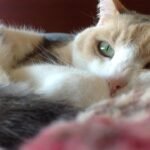Have you ever wondered if your feline companion actually misses you when you leave the house? Despite their reputation for independence, cats are surprisingly emotional creatures who form deep bonds with their humans. Recent research from Oregon State University reveals that roughly sixty-four percent of cats displayed secure attachment styles with their owners, surpassing even dogs in their emotional connections.
While cats might not greet you at the door with tail-wagging enthusiasm like dogs do, they have their own subtle yet unmistakable ways of expressing their longing. These behaviors often go unnoticed by busy pet parents, but once you know what to look for, you’ll recognize the touching signs that your cat has been missing your presence. Let’s explore these heartwarming behaviors that prove your feline friend cares more than you might think.
Waiting by the Door Like a Faithful Guardian

If their favorite human is not at home, the kitty may sit at the front door calmly and patiently waiting for their return. This touching behavior shows just how much your cat anticipates your homecoming. It is no wonder that your cat knows exactly when you are about to enter your home, they have great hearing, can detect a broad range of frequencies, and hear higher-pitched sounds than humans and, actually, most dogs. So, when you park in your garage or take the elevator, they know, because they hear you.
If you find your cat strategically placed by the door with an expectant gaze and alert ears, as if anticipating the sound of your keys or your footsteps; most surely, it has missed you and has been anticipating your return. This behavior demonstrates their strong emotional attachment and their eagerness to reunite with their beloved human companion.
Excessive Vocalization Upon Your Return

While not renowned for their vocal nature, some cats become more expressive in their meowing when they yearn for their owner. An increased meowing is a sign that they missed you and crave your attention. You might notice your typically quiet cat suddenly becoming quite chatty, using different tones and sounds to communicate their feelings.
Cat behavior experts note that increased vocalization can be a sign your cat misses you: Your cat may make more sounds, like meowing and trilling, to communicate with you and get your attention. Some cats even develop a special greeting call reserved just for their returning owner, almost like they’re saying “Where have you been? I missed you!”
Heightened Affection and Clingy Behavior

However, yours seems to be a little different; it has been shadowing you even since you got back from your holiday. Think no further, your darling feline missed you terribly. This sudden increase in clinginess is one of the most obvious signs that your cat experienced separation distress while you were away.
If your cat comes trotting over to you when you get home and displays behaviors like headbutting you, purring, and chirping or trilling contentedly, this is a sure sign that they’re ecstatic to see you. They might follow you from room to room, seeking constant physical contact and reassurance that you’re really back home where you belong.
Intense Purring and Kneading Sessions

Rhythmic paw-kneading is a behavior reminiscent of kittenhood nursing, and it often surfaces when your cat is feeling content and secure. A combination of that with symphonic purring is the sign you have been waiting for: your kitten missed your companionship and is overjoyed that you are back. This powerful combination creates an unmistakable symphony of love.
The kneading motion, often accompanied by an unusually loud purr, represents their attempt to recreate the comfort and security they felt as kittens with their mother. When directed toward you after an absence, it’s their way of saying they’re relieved and happy to have their primary source of comfort back home.
Sleeping in Your Personal Items

Cats love their scent, it is their way of marking territory, and purr-claiming, “You are mine!” Therefore, if you find your cat nestling among your recently worn clothes, that is a clear indicator that they are longing for you. This behavior provides them comfort through your familiar scent when you’re not physically present.
When owners leave home, cats usually stay in their usual places, such as on the owner’s bed or chair. The psychological mechanism behind this behavior could be that cats try to find comfort in the smell of their owner. Finding your cat curled up on your favorite sweater or pillow isn’t just cute, it’s a genuine expression of missing you.
Changes in Eating and Sleeping Patterns

Feeling depressed: If your cat is sleeping a lot or eating less while you’re gone, they might be depressed or have separation anxiety. These behavioral changes can persist even after your return as your cat readjusts to your presence.
Some cats may show a loss of appetite after their owner leaves home. This could be due to digestive issues caused by anxiety, or it could be a way for cats to express their missing to their owner. You might notice they eat with more enthusiasm once you’re back, almost as if your presence makes food taste better again.
Excessive Grooming or Self-Soothing Behaviors

Cats, when experiencing stress or anxiety due to your absence, may resort to excessive grooming as a coping mechanism. If you observe them engaging in this behavior more than usual, it’s a potential sign that they missed you. This compulsive behavior serves as their way of managing the emotional stress of separation.
Cats groom themselves to maintain cleanliness, but they may over-groom themselves in times of stress, such as when they miss their owners. However, over–grooming can result in hair loss, skin redness, and damage, and it can be a sign of separation anxiety, as it serves as stress relief for them. If you notice any bald patches or irritated skin, it might be time to consider ways to reduce their separation anxiety.
Conclusion: Understanding Your Cat’s Heart

Cats are far from the aloof and solitary beings they’re often made out to be. In reality, they can form deep emotional bonds and meaningful connections with their human companions. Understanding the subtle ways cats show they miss their owners is a powerful reminder of just how strong those bonds can be.
The next time you notice any of these behaviors, take a moment to appreciate the depth of your cat’s emotional world. These seemingly simple actions are actually profound expressions of love, attachment, and genuine longing. Your feline friend might not wear their heart on their sleeve like a dog might, but their quiet devotion runs just as deep.
What do you think about your cat’s unique way of showing they miss you? Have you noticed any of these touching behaviors in your own feline companion?






